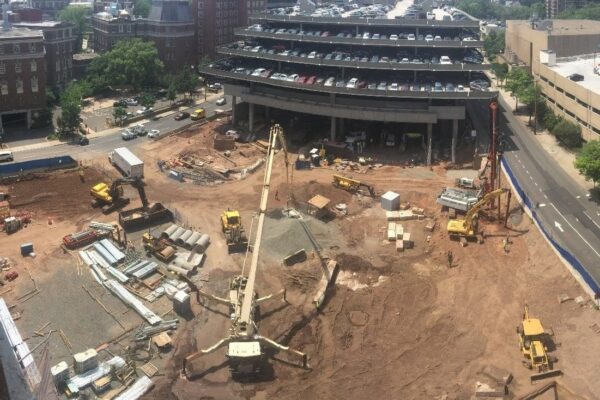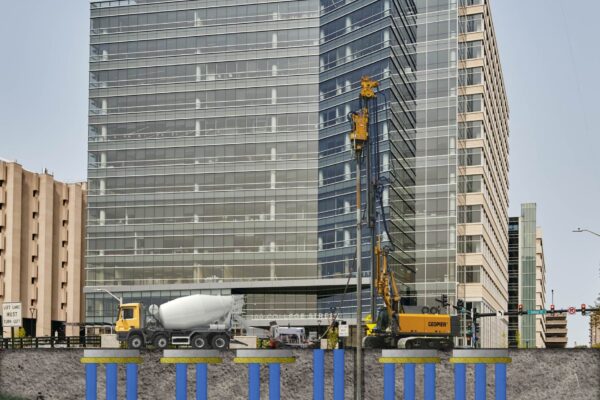Introduction:
The Downtown Crossing/Route 34 East project was a multi-phase redevelopment located in downtown New Haven, CT. The first phase featured the construction of a 14-story office building and 10-story parking garage located on College Street, at the intersection with Route 34. Loads for columns and mats exceeded 4,000 kips and wall footing loads surpassed 60 kips per linear foot.
Geotechnical Challenges:
The project team faced a variety of geotechnical challenges including the presence of fill, soft organic soils, compressible natural sand/silt and a relatively high groundwater table combined with heavy loads. Supporting footings and slabs directly on the existing unimproved soils would have led to excessive settlement.
Geotechnical Design Solution:
The design team evaluated a number of foundation support solutions including augercast piles and structural slabs, and shallow footings and slabs-on-grade after Geopier GeoConcrete® Column (GCC) Rigid Inclusion and Rammed Aggregate Pier® (RAP) ground improvement. The Geopier GCC and RAP solution was substantially less expensive and faster than the augercast pile option and proved to be the best geotechnical solution for the project.
Geopier GCCs and RAPs allowed for traditional shallow footings and slab-on-grade construction. The GCCs were designed to limit total and differential post-construction footing settlement to less than 1 ½ inches and 1 inch respectively, and provided a maximum allowable footing bearing pressure of 9.5 kips per square foot.
- Substantial cost savings compared to augercast piles and structural slabs.
- Simplified foundation construction using shallow footings and slabs-on-grade.
- Displacement technique eliminated dewatering and excess spoils.
- Fast installation.
Ground Improvement Construction:
Helical installed more than 900 GeoConcrete Column Rigid Inclusion elements and 100 Rammed Aggregate Piers with one Geopier rig and crew. They were installed using a displacement technique that did not require dewatering and did not generate excess spoils, ultimately reducing premium dewatering and off-site soil disposal costs. Geopier GCCs were used to support footings, while Geopier RAPs were used to support slabs-on-grade. Helical’s designer engineered a structural fill pad (“footing pad”) beneath the footings to help transfer footing stresses to the GCCs and surrounding matrix soil. The footing pads also provided a stable subgrade for footing construction.
Quality Assurance And Control:
Helical’s crew included a full-time Quality Control person to oversee all testing and installation procedures. A full-scale modulus test was conducted on a test footing supported by a group of three GCCs to 200% of the GCC element design stress. Two individual GCC modulus tests were also performed to 200% of the GCC element design stress. The testing results showed deflections of less than 1/4 -inch at the design stress levels indicating superior performance of the ground.



